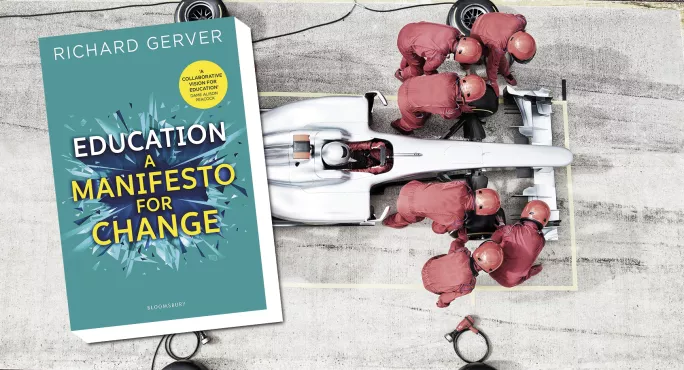- Home
- Book review: Education: A Manifesto for Change
Book review: Education: A Manifesto for Change

Education: A Manifesto for Change
Author: Richard Gerver
Publisher: Bloomsbury Education
Details: 128pp, £19.99, paperback
ISBN: 9781472962362
When Education: A Manifesto for Change landed on my desk, I was preparing for its author, Richard Gerver, to kick open the saloon doors of my mind and start shooting from the hip with revolutionary ideas. A showdown in the wild west of education today. The front cover depicts the title of the book exploding through broken glass, so I was expecting a similar punch from the manifesto. Maybe I would find “the answer” to our broken education system and, in Gerver, a messiah-like figure to deliver the message.
What I found instead was quite different to that. But I wasn’t disappointed.
The 2008 global financial crisis, the legacy of austerity - and its political repercussions - act as a backdrop to the manifesto. Gerver recognises that many people feel disillusioned with our politicians and tired of waiting for them, or indeed anyone, to solve society’s problems, including the state of today’s education system. However, Gerver argues that we shouldn’t be waiting for someone else to fix education. His manifesto claims that we can fix it ourselves.
In an attempt to empower us to change the system from within, the author suggests a broad range of actions and personal qualities that he invites us to endorse. For example, a constant theme running throughout the book is Gerver’s belief in the power of collaboration between individuals to effect change. He suggests that educators should be having more conversations with one another, with business people and with scientists and artists. He says this will broaden our perspectives and deepen our practice. Gerver also inspires us with insightful examples from his own discussions with a range of world-renowned leaders, such as Barack Obama and Apple co-founder Steve Wozniak among others.
In the spirit of collaboration, he directly addresses educators who use social media and urges us not to engage in polarising arguments online. He encourages discussion and passionate debate, but makes it very clear that online spats between educators won’t evolve the education system at all. He puts one such example, the contentious issue of whether it is better to teach knowledge or skills, neatly to rest in the book.
Collaboration ‘can fix education’
The author offers further antidotes to discord and division, within education and society as a whole, by encouraging us to cultivate gratitude, curiosity, love, openness and trust. Positive educators and educational settings are authentic, risk-taking, open-minded and are able to make mistakes. They will also be happy to model this behaviour to their students and colleagues, according to Gerver.
The author is relentlessly optimistic and forward-thinking in his manifesto. He believes in the power of communities and celebrates the talents of teachers and school leaders everywhere. He is particularly enthusiastic and hopeful about children and young people and believes that, with our help, they can look forward to a bright future.
Gerver skilfully observes cultural phenomena and suggests ways that we can learn from them. One example of this is the rise in the number of criminal gang members. The manifesto shines a light on what is going on here and offers insights and solutions to the issue.
He believes that the curriculum and the way that we teach it needs to evolve and that we spend too much time trying to make the existing system more “efficient”, rather than looking for new ways to improve it. The human race has not evolved and developed through history because of a focus on efficiency; it has evolved because of our natural born curiosity and our desire to learn, to challenge, to innovate and to be better.
Gerver also reminds us that there are numerous education settings, teachers and school leaders doing great work and innovating from within the system. “There are brilliant teachers, in brilliant schools, doing inspirational things and they aren’t rare; they are you!”
There isn’t a hint of negativity within this book. Nothing to rile or to side against. In fact, Gerver intentionally steers the reader away from any sort of confrontation and animosity, gently guiding us towards a broader vision. Not his own personal vision for educational change, but to one which is our own and unique to our setting.
Instead of the book being the gun-slinging shootout with the system and rival ideologies I imagined, I was instead taken on an immersive and surprising journey. It was a journey that meandered through the author’s years of observing and connecting with a wide range of people, experiences and insights. A bare-foot journey, which felt reflective, authentic and, as the title suggests, potentially leading to change.
Mike Fairclough is headteacher, West Rise Junior School, Eastbourne. He tweets @westrisejunior
You can support us by clicking the book title link above: we may earn a commission from Amazon on any purchase you make, at no extra cost to you
If you or your class would like to write a review, please contact kate.parker@tes.com
Keep reading for just £1 per month
You've reached your limit of free articles this month. Subscribe for £1 per month for three months and get:
- Unlimited access to all Tes magazine content
- Exclusive subscriber-only stories
- Award-winning email newsletters



